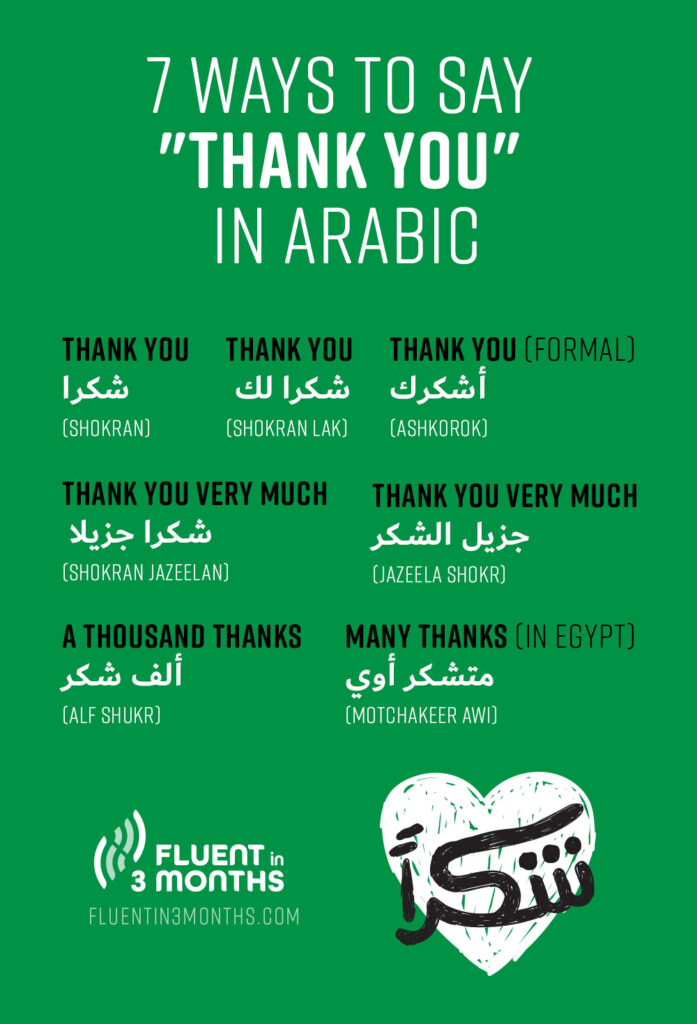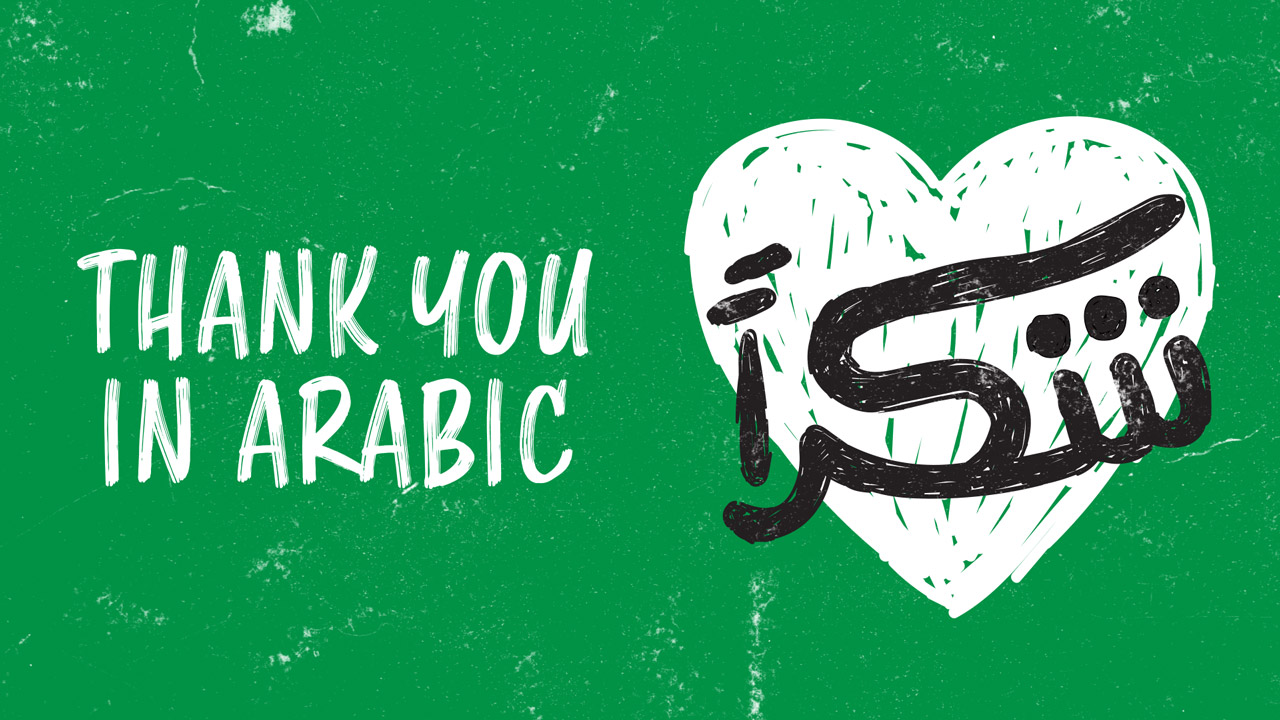How to Say “Thank You” in Arabic
There are so many different ways to say “thank you” in Arabic. And I want to tell you all about them!
Keep reading for a list of all the different ways you can express your appreciation in Arabic and impress your Arabic speaking friends. Arabic is known for its creativity and the way it can express the same things in different ways, each one competing with the other to win your heart.
I’ll be covering all the possible ways to say “thank you” in both Modern Standard Arabic and the different Arabic dialects, so keep an eye out for that.
Without further ado, let’s get started!
Table of contents
- Quick Guide on How to Say “Thank You” in Arabic
- Common Ways to Say “Thank You” in Arabic
- Religion and Saying “Thank You” in Arabic
- “Thank You Very Much” in Arabic
- “Thank You for the Food” in Arabic
- Thanking Someone for Doing Something for You in Arabic
- “Thank You” in Different Arabic Dialects
- “You’re Welcome” in Arabic
- Other Arabic Words for “Thanks” and “Appreciation”
Quick Guide on How to Say “Thank You” in Arabic
Here’s a quick overview of some different ways to say “thank you” in Arabic:
- شكرا (shokran) – “thank you”
- شكرا لك (shokran lak) – “thank you”
- أشكرك (ashkorok) – “thank you” (formal)
- شكرا جزيلا (shokran jazeelan) – “thank you very much”
- جزيل الشكر (jazeela shokr) – “thank you very much”
- ألف شكر (alf shukr) – “a thousand thanks”
- متشكر أوي (motchakeer awi) – “many thanks” (in Egypt)
Read on for more details about all of these (and more).

Common Ways to Say “Thank You” in Arabic
Depending on the country you’re visiting (or the dialect you’re learning), there will be different Arabic variations of “thank you” they’re using. Fret not! There are many ways to express thanks widely used across all Arabic-speaking countries.
The first and most common ones are شكرا (shokran) to say “thank you.” This is the most basic, and the one used in both formal and informal settings.
Whenever the situation arises when you need to thank someone, say شكرا (shokran) or شكرا لك (shokran lak). لكَ (laka) or لكِ (laki) is “you” in English; one is masculine and the other is feminine, respectively. Yes, the difference depends on the position of the little line.
Additionally, you can say أشكرك (ashkorok). It’s similar to the previous ones except it’s used in formal settings.
Religion and Saying “Thank You” in Arabic
It is common knowledge that Arabic, as a language, existed many centuries ago. Yet, since it’s the language of the Quran, the Islamic holy book, a lot of Arabic expressions integrate prayers as part of the language.
Having said that, let’s explore some ways we, as Arabs, use prayers as a way to express gratitude.
For example, we say بارك الله فيك (baraka Allahu feek) and جزاك الله خيرا (jazaka Allahu khayran) as a way to say “thank you so much for helping me”. خير (khayr) means “good” in Arabic, so جزاك الله خيرا (jazaka Allahu khayran) translates to “may God reward you with goodness”.
We also say جعله الله في ميزان حسناتك (ja’alaho Allah fi mizan hasanatek) to say “may Allah accept it in your favor.”
“Thank You Very Much” in Arabic
A formal way of saying “thank you very much” is شكرا جزيلا (shokran jazeelan) or جزيل الشكر (jazeela shokr) (both mean the same thing). These are understood in all Arabic-speaking countries and the typical response is أهلا و سهلا (ahlan wa sahlan). جزيل (jazeel) means “a lot.”
If you want to express your gratitude even more, you can say ألف شكر (alf shukr), which translates to “a thousand thanks”. Using this expression clearly conveys the immense appreciation you’re feeling.
In Egypt, you can say متشكر أوي (motchakeer awi) to say “many thanks.” أوي (awi) means “a lot.” You can say this when you’re very grateful to someone because they’ve been quite generous to you.
“Thank You for the Food” in Arabic
Imagine you’ve been invited to have dinner with your Arab friend, the food was delicious and now you want to thank them. Or, imagine the opposite, you’re the host.
The most common one is صحة (sahha), or the longer version بالصحة و العافية (besseha wa al afya) which means “may this bring health to you”. The reply would generally be الله يسلمك (Allah ysalemk).
You can also say بالهناء و الشفاء (bilhana’e wa shifa’e), “with blessing and healing” in English when serving, to which the answer is تسلم/تسلمي (“teslam/teslami”).
Note: In Arabic, adding ي (pronounced i) at the end of words makes them feminine.
Sometimes, you may want to say “sorry for bothering you” if you feel a bit overwhelmed and really grateful for the food prepared for you. In this case, say عذبناك (aadabet halak_. The reply is usually هذا واجب (hada wajeeb).
Thanking Someone for Doing Something for You in Arabic
People in Arab countries are very welcoming, especially to visitors. They’ll go out of their way to make you feel at home because it’s actually something that we’ve been accustomed to since a very young age.
So, if you want to thank someone for something specific they’ve done for you. I have a simple script you can use.
All you have to do is add ي to the thing they’ve done and add it to “thank you for”, which شكرا على (shokran aala).
For example, to say “thank you for helping me prepare for the exam”. You can say شكرًا لك على مساعدتي في التحضير للامتحان (shokran aala mosa’adati altahdir lil’imtihan).
Another example: “Thank you for the valuable advice” would be شكرا على النصيحة القيمة (shokran aala alnassiha alqayyima).
In this example, we didn’t add the ي because there isn’t a verb like in the first example. Also, keep in mind that you can add laka or laki after shokran to make it even more personalized.
Depending on who you’re addressing, choose the appropriate one:
“You” masculine: لكَ (laka)
“You” feminine: لكِ (laki)
“You” dual: لكما (lakoma)
“You” plural feminine: لكن (lakonna)
“You” plural masculine: لكم (lakom)
“Thank You” in Different Arabic Dialects
As I mentioned earlier, each Arabic-speaking country has its own variation of saying “thank you.”
Starting with Egypt, متشكر (moutashakir) is used in any situation to say “thanks.” If you’re male, you say متشكر (moutashakir), but if you’re a female, you say متشكرة (moutashakira). You can also say شكرا جزيلا (shokran gazeelan) as a way to say “thank you very much.”
This is in fact from Modern Standard Arabic, but it differs from the Egyptian dialect in the pronunciation. In MSA, it sounds like jazeelan. But, in Egyptian Arabic, it’s pronounced gazeelan.
Additionally, please keep in mind that Egyptians sometimes add the a sound at the end of words to differentiate between masculine and feminine.
In the regions around Lebanon and Syria, they also say مرسي (merci) to say “thank you,” which is a word adopted from French. يسلمو (yeslamo) is another great way of saying “thank you” in Levantine Arabic (or even Arabic in general). It means “may your hands be protected”, which is a lovely thing to say when someone gives you something.
In Morocco Darija Arabic, we say يعطيك الصحة (ya’atik sahha), which translates to “bless you” in English.
In Gulf Arabic, they say ما قصرت (ma qassart) to let the person know that they’re grateful for what they’ve done for them. It literally means “you didn’t limit your favor to help me”. They also say يعطيك العافية (yaatik al afye), which translates to “may God give you health”.
Fun fact: When I was younger (around 8~10 years old), whenever I heard يعطيك العافية (yaatik al afye), I would think it was an insult. Why? Well, I’m Moroccan, and عافية (afye) for us means “fire”, so I would think they’re saying it hoping to get someone on fire. It isn’t. I’ve long since corrected this wrong assumption of mine. But it’s wonderful (and a reminder to proceed with caution) to see how dialects differ even though we all essentially speak the same language.
“You’re Welcome” in Arabic
Now that you know how to express your appreciation in Arabic, it’s time to learn some common ways to reply to a “thank you” in Arabic.
Generally, you’ll reply with one of these three:
عفوا (afwan) – “you’re welcome”
العفو (al aafw) – “you’re welcome”
على الرحب والسعة (ala arohb wa si’aa) – “you’re welcome”
As you can see, they all mean the same thing and are accepted as responses to “thank you.” They’re also used regardless of whether the setting is formal or informal.
Sometimes, though, we tend to reply with لا شكر على واجب (la shokra ala wajeeb), which is an MSA phrase that translates to “no need to thank me, it’s my duty”. This is a pretty casual way to convey that it’s not a big deal.
In case you’re trying to say “you’re welcome” as in welcoming someone to a place, you say either مرحبا (marhaba) or أهلا (ahlan). Similarly, you can say أهلا و سهلا (ahlan wa sahlan).
If the country you’re in is Egypt, you can say مفيش مشكلة (maheesh moshkeela), which translates to “no problem” in English. You can also say ولا يهمك (wala yehemak) as in “never mind.”
Moreover, if you’re staying in or learning Moroccan Darija, just say ماشي مشكل (machi mochkil), “no problem” in English. Or say هذا واجب (hada wajeeb), basically an iteration of la shokra (ala wajeeb).
Other Arabic Words for “Thanks” and “Appreciation”
Before you go and flex those Arabic mental muscles in front of your new Arab friends, let us see some other words for “thanks“ and “appreciation” in Arabic.
Appreciation in Arabic has two meanings. It is either تقدير (taqdeer) as in understanding the value of something (or someone) or امتنان (imtinan) as in feeling grateful for something. You can probably see now where أنا ممتن لك (ana momtan lak) comes from.
Feeling and expressing appreciation for someone is a universal experience. In fact, you don’t always need words to show your gratitude for an act that meant so much to you. But, you can use your words to voice your thanks and to deepen the bonds between you and your friends, especially if you take time to learn it in their language. That will surely mean a lot to them (and you too!).



Social